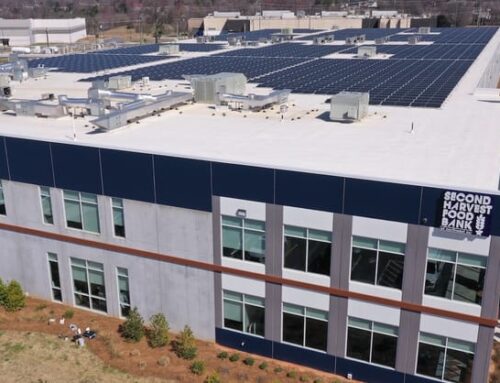A proposal for a Massachusetts wood-burning plant is back from the…
June 9, 2025

A plan to build a wood-burning power plant in a Massachusetts city once dubbed the asthma capital of the country could be springing back to life years after state and local officials struck it down — and opponents are ready to renew their fight against what many call a “zombie project.”
Palmer Renewable Energy, the developer of the project in the city of Springfield, recently won a pair of legal victories reversing previous decisions to revoke key permits. At the same time, a little-known provision buried in the state’s 2021 climate law could pave the way for the project to improve its financials by selling renewable energy credits.
Local residents, community leaders, and environmental advocates are gearing up for another round of resistance by appealing the recent court rulings and pushing legislation to block the developer’s financial path forward.
“It’s really urgent,” said Laura Haight, U.S. policy director for the Partnership for Policy Integrity, a nonprofit that advocates against burning wood for power generation. “This is about making sure Palmer doesn’t rise again. There is no benefit — there’s only downside for the community.”
Palmer first proposed the plant in 2008, pitching it as a sustainable way to generate electricity by burning the woody waste left behind when utilities trim vegetation along power lines. The Springfield City Council issued initial approvals with little fanfare or public attention. Not long after, however, local residents and advocates realized what had happened and began to mobilize against the plan, kicking off years of debate and litigation.
Springfield, the third-largest city in Massachusetts, has long grappled with poor air quality and high asthma rates. The city sits at the intersection of two interstate highways, has a long industrial history, and was for many years home to a coal-burning power plant and neighbor to an oil and gas-fired plant. In 2018 and 2019, the Asthma and Allergy Foundation of America dubbed the city the country’s asthma capital because of the prevalence of the disease and the high numbers of emergency room visits.
A wood-fired power plant may have an environmentally friendly ring to it. Proponents argue that the process is carbon-neutral because new trees can be grown to capture carbon, offsetting the emissions. However, researchers have found that promise is not the reality: The emissions created by burning wood have years to do climate damage before regrowth is adequate to absorb the added carbon dioxide. Burning woody biomass releases 50% more carbon dioxide than coal and three to four times as much as natural gas. Wood-burning facilities also emit other air pollutants and particulate matter that can cause or aggravate respiratory conditions.
Still, power plants that burn wood have often been propped up as valuable, sustainable resources. In the United Kingdom, the country’s largest single emitter is a wood-fired power station that, as of 2022, released more than 12 million metric tons of carbon dioxide per day. In European Union countries, the production of wood pellets to fuel power plants is big business, despite the objections of scientists and climate advocates.
In Springfield, a new power plant that would burn more than 1.2 million pounds of wood a day was not — and is not — an acceptable option, said many angry public health advocates, environmental activists, community leaders, and average citizens.
“It was a bad idea then, and it is still a bad idea,” said Sarita Hudson, senior director of strategy and development at the Public Health Institute of Western Massachusetts. “The community is against it.”
In 2015, however, the Massachusetts Supreme Judicial Court ruled in favor of Palmer in one of the cases challenging its permits, a decision that seemed to clear the way for construction. Palmer, however, never started building. So, in the spring of 2021, the Springfield Zoning Board of Appeals, at the request of the city council, ruled the project’s permits invalid, and the state rescinded its environmental approval, citing this lack of progress.
Opponents celebrated the demise of the project.
Back from the dead
Palmer, however, was not ready to give up and appealed both of those decisions, arguing that statewide permit extensions implemented during the Great Recession and the Covid-19 pandemic meant it had more time to begin work. In January, the Massachusetts Superior Court agreed and ruled the project’s state air permit is still in effect. A few months later, the state Appeals Court also found Palmer’s building permits still valid, creating what many are calling a “Franken-permit.”
Both the state and Springfield City Council have appealed these rulings.
“There’s nothing stopping Palmer at this point from going back and applying for new building permits,” said Alexandra St. Pierre, director of communities and toxics for the Conservation Law Foundation, which is representing the city of Springfield in court. But the company would be unlikely to get approval this time around, she said, “and that’s why they’re pushing and pushing and pushing this issue.”
Permits are not the only potential hurdle: The plant still needs to make money, and observers doubt just selling power onto the grid would bring in enough revenue to turn a profit on an investment of that scale.
Earlier in the process, the administration of then-Gov. Charlie Baker (R) considered adding biomass facilities like Palmer to the list of renewable energy resources that qualify for the state’s renewable portfolio standard. Investor-owned utilities meet the standard by buying credits from operators of eligible renewable energy generation. Putting biomass on the list of renewable options would have allowed Palmer to make money selling such credits.
As public opposition mounted in 2021, however, Baker scrapped that proposal. But Palmer was already working on another plan.
While investor-owned utilities are required to meet the renewable portfolio standard, the state’s 41 municipally owned power companies are not. A 2021 climate law, however, created a new, separate standard for municipal utilities. The legislation does not include biomass on the initial list of eligible renewable resources, but does include a line adding biomass to the options as of 2026.
Palmer did not respond to requests for comment, so Canary Media cannot confirm when company leaders knew this addition was likely. But by late 2019, the developer had connected with Energy New England, a cooperative of municipal power companies, to promote the plant. In early 2020, eight municipal power companies signed contracts to buy 75% of the energy the Palmer plant was to produce.
“Which meant they were very, very close to having whatever financing they needed to get this project built,” Haight said.
As the project continued to stall and public sentiment against the plant grew, the municipal utilities all dropped their contracts in 2023. Observers, however, worry that some would sign back up if it helped them meet state requirements, either because they don’t know about the negative impacts of wood burning or because they are willing to overlook them.
Lawmakers in both the state House and Senate have introduced legislation to prevent biomass from joining the list of eligible resources next year. Gov. Maura Healey (D) also included the measure in the major energy bill she introduced last month, though supporters worry that legislation won’t advance quickly enough.
“There’s nothing subtle about this,” Haight said. “We have to close this loophole.”
Sarah Shemkus
is a reporter at Canary Media who is based in Gloucester, Massachusetts, and covers New England.
read next
Search
RECENT PRESS RELEASES
Related Post




